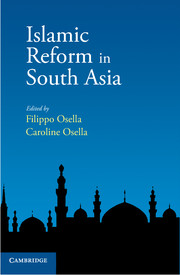Introduction
Published online by Cambridge University Press: 05 January 2014
Summary
The authors in this volume discuss contemporary Islamic reformism in South Asia in some of its diverse historical orientations and geographical expressions, bringing us contemporary ethnographic perspectives against which to assess claims about processes of reform and about trends such as ‘Islamism’ and ‘global Islam’.
The very use of terminology and categories is itself fraught with the dangers of bringing together what is actually substantially different under the same banner. While our authors have often found it necessary, perhaps for the sake of comparison or to help orient readers, to take on terms such as ‘reformist’ or ‘Islamist’, they are not using these as terms which imply identity—or even connection—between the groups so named, nor are they reifying such categories. In using such terms as shorthand to help identify specific projects, we are following broad definitions here in which ‘Islamic modernism’ refers to projects of change aiming to re-order Muslims' lifeworlds and institutional structures in dialogue with those produced under colonial and post-colonial modernity; ‘reformism’ refers to projects whose specific focus is the bringing into line of religious beliefs and practices with what are held to be the core foundations of Islam, by avoiding and purging out innovation, accretion and the intrusion of ‘local custom’; and where ‘Islamism’ is a stronger position, which insists upon Islam as the heart of all institutions, practice and subjectivity—a privileging of Islam as the frame of reference by which to negotiate every issue of life; ‘orthodoxy’ is an interesting term,[…]
- Type
- Chapter
- Information
- Islamic Reform in South Asia , pp. xi - xxviiiPublisher: Cambridge University PressPrint publication year: 2013
- 2
- Cited by

